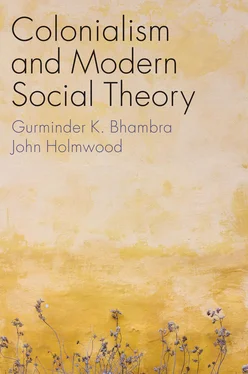At this point we should enter a caveat. Although European colonialism is more extensive than that exercised by Europe’s northern powers, since Spain, Portugal, and Italy were colonial states too, European social theory came to be associated with northern Europe. Whereas this dominance is usually paired up with a particular sociological argument that connects Protestant Europe with capitalist modernity, we shall argue that it derives from the connection between colonialism and commercial enterprise. As already indicated, we are seeking to provide not a comprehensive account of European social thought but an account that pays heed to writers whose work is regarded as definitive for contemporary social theory.
The Idea of Modern Society
Contemporary sociology, in its Eurocentric mode, is formed around a straightforward historiography of modernity. This is a historiography that typically rests on ideas of the modern world as emerging out of processes of political and economic revolution – specifically, processes associated on the one hand with the eighteenth-century American Revolution and French Revolution and, on the other, with industrialisation, in Britain and elsewhere, in the subsequent century. These are what Robert Nisbet (1966) called ‘the two revolutions’. The same historiography is seen as being underpinned by earlier cultural changes across Europe brought about by the Renaissance, the Reformation, and the scientific revolution (Bhambra 2007). Such understandings conflate Europe with modernity – and in this context the United States is treated as if it were coextensive with Europe, as one of its settler colonies. In this way they render the process of becoming modern, at least in the first instance, one of endogenous European development. At the same time, the rest of the world is regarded as external to these world-historical processes, and colonial connections are presented as insignificant to their development.
For many commentators, theoretical reflection on the processes in question takes place in two phases. The first phase would be the emergence of a distinctively European voice, associated with an eighteenth-century Enlightenment and involving reflection on religion, politics, and culture. This voice is taken to be philosophical in orientation and not to have yet developed a full sociological sensibility (Heilbron 1995). The second phase would be a development of the mid to late nineteenth century that culminates in the period of classical sociological theory associated with Weber and Durkheim. Here a dominant sociological account of modernity comes to rest on two fundamental assumptions: rupture and difference (Bhambra 2007). A temporal rupture distinguishes a traditional, agrarian past from the modern, industrial present, and this distinction goes hand in hand with a fundamental cultural differentiation of Europe from the rest of the world – or, in the words of Stuart Hall (1992), with a separation of ‘the West from the rest’. These paradigmatic assumptions have framed both the standard methodological problems raised by modern social inquiry and the explanations proposed in resolving them. It is these assumptions that we question.
While accounts of the Industrial Revolution and French Revolution – and, by implication, of modernity itself – have not remained unchanged over time, what has remained constant is the framing of the European origins and subsequent global diffusion within which these events are located. Whatever their other differences, the early sociologists believed themselves to be living through a (or perhaps the ) great transformation in history; and they were concerned to understand how it had begun, as they wished to influence how it would be brought to the completion that, in their view, was inherent in it. Not only were others not recognised within accounts of the now canonical two revolutions, but the potential contribution of other events (and of the experiences of non-western others) to the sociological paradigm of modernity has rarely been considered. As Steven Seidman (1996: 314) remarks, sociology’s self-conscious emergence coincided with the high point of western imperialism, and yet ‘the dynamics of empire were not incorporated into the basic categories, models of explanation, and narratives of social development of the classical sociologists’.
Our argument is that modern social theory entails a double displacement . Empire has an earlier phase, namely colonialism. This phenomenon emerged from the fifteenth century onwards. It preceded the Enlightenment and was continuous with it. Colonialism was attributed to the European ‘discovery’ of new worlds and involved the appropriation of lands, their settlement, and the development of commercial trade in the resources extracted from them. The early period of colonialism, which involved the use of forced labour in mines and on plantations, is usually understood as a premodern phenomenon that is not essential to the development of modernity. This makes it easier to neglect the fact that European colonialism transformed into imperialism.
Identifying social theory with the period from 1830 onwards, then, makes it easier to normalise colonialism and to take for granted the overseas possessions of the national European states whose political structures of the rule of law, market exchange, bureaucratic administration, and political representation are proposed as part of the distinctive social and political configuration of modernity, independently of colonialism and imperialism. We shall argue instead that colonialism and imperialism are integral to modernity and not contingently related to it. Colonialism is not a manifestation of commercial enterprise in the last throes of feudalism, but is constitutive of the commercialism that would come to be seen as characteristic of modernity and integral to the development of the social and political institutions associated with it. By contrast, when empire is addressed, it is as a manifestation not of European modernity, but of the political organisation of earlier social formations. In this book we argue for the need to disentangle modern European empires from more general conceptions of empire (from before the existence of European colonial empires) and for the need to understand how modern European ‘nation’ states are shaped by their imperial and colonial past.
Empires and European Colonialism
For the most part, European social theory has been in denial of the colonial and imperial past of Europe and the significance of this past for how social theory has been configured. Such denial takes several forms. One is the absence of a discussion of European colonialism and imperialism and their legacies when reflecting on contemporary global social, economic, and political issues. Another, seemingly paradoxical form is the claim that we have spent too much time discussing the colonial past, that we should just move on from it and beyond any perceived need to make amends for it. A third form of denial is to argue that, in any case, empire and its typical forms of domination are by no means exclusive to Europe. By contrast, in this book we begin from a position that focuses explicitly on Europe, its colonial and imperial histories, and the ways in which these continue to shape the world. We also suggest that there was something distinctive about European empires by comparison with other forms of empire, something that does require redress. This redress would have two aspects. One concerns the policies that mitigate the inequalities that colonialism bequeathed. The other consists in a reconstruction of the categories and concepts through which modern inequalities are understood. In the present book we deal with this second aspect. While the first is materially the most important one, a major obstacle to its realisation is the failure to make the legacies of colonialism central to our understanding of modern society and its problems.
Читать дальше












